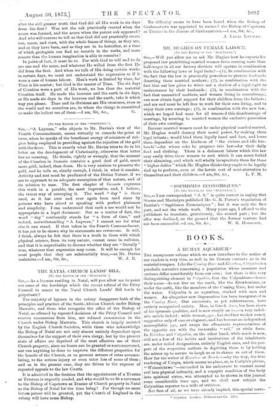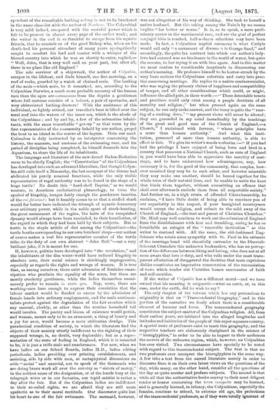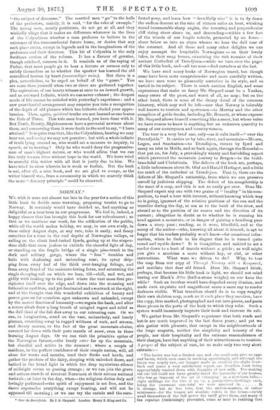BOOKS.
A HUMAN AQUARIUM.*
TILE anonymous volume which we now introduce to the notice of our readers is very thin, as well in its literary contents as in its material compass. Like the Coming Race and Erewhon, C'nlymbia is a parabolic narrative concerning a population whose manners and customs differ considerably from our own ; but there is this very distinguishing element in Ce/yetbiu, that the Colymbians—lience their name—do not live on the earth, like the Erewhonians, or under the earth, like the members of the Coming Race, but under the water. Colymbia is an aquarium, stocked with men and women. An altogether new dispensation has been inaugurated in the Coming Race. Our successors, as yet subterranean, have entirely reorganised society. Man, in Greek liter, has been shorn of his tyrannic qualities, and is now simply an an,—a very indefi- nite article indeed ; while woman, gym, has shed her weaker vowel, suggestive only of ease or elegance, and has become an independent monosyllabic yr, and sways the effeminate representatives of the opposite sex with the inexorable " vril," or virile force. In Erewhon and Colynabia, on the other hand, while much is new, still not a few of the habits and institutions of the inhabitants are, under veiled designations, entirely English ones, and the pur- port of the respective authors in depicting them is by holding the mirror up to nature to laugh us or to shame us out of them. How far the writer of Erewhon or Nowhere—by the way, the true rendering of Utopia, which means no place, or, in Carlyle's phrase, " Weissnichtwo "—succeeded in his endeavour to convert moral evil into physical infirmity, and a eupeptic condition of the body into spiritual virtue, was attempted to be shown in this journal some considerable time ago, and we shall now subject the Colymbian reporter to a trifle of criticism.
But first of all, as we have already implied, this special corre-
• Colymbia. London: TrUbner and CO. 1573,
spondent of the remarkable bathing colony is not to be bracketed in the same class-list with the author of Nowhere. The Colymbiad is very mild indeed, compared with the scornful power which is felt to be present in almost every page of the earlier work ; and the writer in the end is so thankful to escape from his aquatic friends, that he reminds us of the good Bishop who, when on his death-bed his personal attendant of many years apologetically sought to comfort his lord and master with a whisper of the blessed country into which he was so shortly to enter, replied,— " Well, John, that is very well said on your part, but after all, there is no place like old England."
The sole survivor of a shipwreck, the author of Colyinhia, escapes in the lifeboat, and finds himself, one fine morning, on a reef of rocks, guarded by a watch of chained seals. The barking of the seals—which seals, be it remarked, are, according to the Colymbian Darwins, a much more probable ancestry of the human race than the apes are—suunnons from the depths a gentleman whose full costume consists of a helmet, a pair of spectacles, and very abbreviated bathing drawers ! With the assistance of this individual, so lightly attired, our traveller's boat is lifted over the coral reef into the waters of the inner sea, which is the abode of the Colymbians ; and by and by, a few of the submarine inhabi- tants, with the same remarkable " get-up " as that worn by the first representative of the community beheld by our author, propel the boat to an island in the centre of the lagoon. Here our meek Columbus is duly instructed by an interpreter concerning the history, the manners, and customs of the swimming race, and his period of discipline being completed, he himself descends into the Aquarium, to share the life of its inhabitants.
The language and literature of the new-found Baden-Badenites seem to be chiefly English; the " Constitution" of the Colymbians has developed into such an advanced liberalism, that though Colym- bia still calls itself a Monarchy, the last occupant of the throne had abdicated his purely nominal functions, while the only visible representative of regal authority was to be found in the shape of a huge turtle ! No doubt this "hard-shell Baptist," as we would veuture, in American ecclesiastical phraseology, to term the symbol of kingship, images fairly enough the ponderous inaction of the roi faineant ; but it humbly seems to us that a stuffed shark would far better have indicated the triumph of aquatic democracy over arbitrary power, while in the noble sport of shark-hunting, the great amusement of the region, the heirs of the vanquished dynasty would always have been reminded, to their humiliation, of the regard in which they had, been held by their subjects. But as turtle is the staple article of diet among the Colymbians—the turtle booths corresponding to our own butchers' shops—our author of course makes a real live representative member of the turtle tribe do the duty of our own abstract "John Bull "—not a very brilliant joke, if it is meant for one.
If, however, politics have developed into "the revolution," and the inhabitants of the dim water-world have reduced kingship to absolute zero, their social science is shockingly unprogressive, especially as regards the rights and wrongs of women. It is true that, as among ourselves, there exist advocates of feminine eman- cipation who proclaim the equality of the sexes, but these are mostly crochetty gentlemen, while the ladies themselves unani- mously prefer to remain in state quo. Nay, more, there are working-men base enough to express their conviction that the labour market would be flooded to excess by the admission of female hands into ordinary employments, and the male sentimen- talists protest against the degradation of the fair creation which any manual, clerkly, or other than the routine household toil would involve. The poetry and bloom of existence would perish, and woman, meant only to be an ornament, a thing of beauty and a joy for ever, would become a mere utilitarian drudge. This paradoxical condition of society, in which the liberators find the objects of their anxiety utterly indifferent to the righting of their supposed wrongs, is, no doubt, very deplorable ; but as a repre- sentation of the state of feeling in England, which it is intended to be, it is just a trifle stale and anachronous. For now, when we have ladies on our School Boards, ladies M.D., ladies editing periodicals, ladies presiding over printing establishments, and assisting, aide by side with men, at metaphysical discussions on evils " social " and unsocial, not to speak of the thousands who are doing brave work all over the country as sisters of mercy," in the noblest sense of the designation, or of the hands busy at the telegraph wires or in our factories, our tepid satirist is rather a day after the fair. But if the Colymbian ladies are indifferent to their so-called rights, we are afraid they are still more apathetic as to their moral rectitude. Our discoverer quite lost his heart to one of the fair swimmers. The mermaid, however, was not altogether of his way of thinking. She took to herself a native husband. But this taking among the Naiads by no means implies " for better or worse." It is, so to speak, a mere preli- minary canter in the matrimonial race, and ere the goal of perfect conjugal bliss is reached, half-a-dozen selections may have been made. In fact, a Colymbian nuptial ceremony is what Carlyle would call only "a sacrament of divorce a la George Sand," and accordingly, the quite lax contract into which our author's lady- love had entered was no hindrance in the world of water, but quite the reverse, to her trying it on with him again. And in this matter we must confess to considerable inaptitude in discovering our author's meaning. He professes himself to be horror-struck by the very loose notions the Colymbians entertain and carry into prac- tice concerning marriage. He replies to a native controversialist, who was urging the primary claims of happiness and compatibility of temper, and all other considerations which could, or might, influence the allied pair, in these words :—" These detestable tenets and practices could only exist among a people destitute of all morality and religion ;" but when pressed again on the same subject, he can only make answer, and the irony is quite the "roar- ing of a sucking dove," "my present views will never be altered ; they are grounded in my mind ineradicably by the teachings of the great and good men of the Church of England,—a Church," I exclaimed with fervour, " whose principles have a more than human authority." And what this insti- tution, possessed of more than human authority, is able to effect is this. We give its writer's words verbatim :—" If you had had the privilege I have enjoyed of being born and bred in a country that possesses a National Church, such as ours of England is, you would have been able to appreciate the sanctity of mar- riage, and to have understood how advantageous, nay, how necessary it is, for the good of the community, that couples, how- ever unsuited they may be to each other, and however miserable they may make one another, should be bound together for the whole term of their natural lives, and be unable to untie the knot that binds them together, without committing an offence that shall ever afterwards exclude them from all respectable society." And further on, in a high strain of offended Churchmanship, he exclaims, "I have little doubt of being able to convince you of our superiority in this respect, if your benighted countrymen would accept the religion, and submit to the mild sway of the Church of Eugland,—the best and purest of Christian Churches." Mr. Miall may well continue to work out the salvation of England from the Establishment with fear and trembling, seeing he has so formidable an eulogist of the " venerable institution " as this writer to contend with. All the same, the old-fashioned Eng- lishmen who retain some sympathy with St. Paul in his estimate of the marriage bond will cheerfully surrender te the Disestab- lishment Crusaders this unknown bookmaker, who has no percep- tion of the difference between liking and loving, who does not at all seem aware that love is duty, and who veils under the most trans- parent affectation of disapproval the doctrine that mere capricious dislike constitutes an imperative consecration of the renunciation of vows which render our Christian homes sanctuaries of faith and self-sacrifice.
If the writer of Colynabia has a different moral—and we have owned that his meaning is enigmatic—what on earth, or, in this case, under the earth, did he wish to say ?
The only chapter of the volume which has any pretensions to originality is that on "Transcendental Geography," and in this portion of the narrative we freely admit there is a considerable element of humour and force. The transcendental geography constitutes the subject-matter of the Colymbian religion. All, from their earliest years, are initiated into the alleged longitudes and latitudes and habitudes of the people of this super-aqueous country. A special caste of professors exist to teach this geography, and the respective teachers are elaborately disciplined in the science of "hieroglyphics," in order to be able to impart to their audiences the secrets of the unknown region, which, however, no Colymbian has ever visited. Two circumstances have specially to be noted with regard to this transcendental subject. The first is that no two professors ever interpret the hieroglyphics in the same way. A few take a text from the sacred literature merely in order to discourse from it on their own latest views on the questions of the day, while many, on the other hand, consider all the questions of the day as quite secular and profane subjects. The second is that while all that the authoritative books convey to their most diligent reader or hearer concerning the terra incognita may be learned, and is generally learned, in infancy, the Colymbians, especially the females, continue to attend, to extreme old age, the prelections of the transcendental professors, as if they were totally ignorant of "the subject of discourse." The married men " go " to the halls of the prelectors, mainly, it is said, "for the sake of example." The young men, mostly positivists, do not go at all, and they wickedly allege that it makes no difference whatever in the lives of the Colymbiaus whether a man professes to believe in the existence of the transcendental future home, or denies that any such place exists, except in legends and in the imaginations of the professors and their devotees. This bit of Colymbia is the only Swiftean section of the volume. It has a flavour of genuine, though subdued, sarcasm in it. It reminds ea of the saying of Fichte, that most people go to hear a lecture or sermon only to satisfy themselves as to whether the speaker has learned the old accredited lessons by heart (auswendiger weise). But there is a plea, nevertheless, to be urged on behalf of the "goers." You are more than yourself when two or three are gathered together. The aspirations of our hearts witness at once to an inward growth, and an outward Infinite, which we can never exhaust ; the deepest needs of life cannot be satisfied with yesterday's experience ; and a new providential arrangement may surprise you into a recognition of the depth of old phrases which has hitherto eluded your appre- hension. Then, again, spiritual truths are not learned as one learns the Rule of Three. This rule once learned, you have done with it. But Truth, Beauty, Righteousness have a perennial newness about them, and concerning them it were death to the soul to say, "I have attained." It is quite true that, like the Colymbians, hearing we may hear not, and seeing we may not perceive; but with a whole infinite of truth lying around us, who would set a measure to inquiry, to speech, or to hearing ? Only he who would deny the progressive- ness of man's highest nature, or who would affirm that we can live truly human lives without hope in the world. We have tried to accredit this writer with all that is justly due to him. We have tried to show wherein he is weak or foolish. But the book is not, after all, a nice book, and we are glad to escape, as the writer himself was, from a community in which we scarcely think the mere "decency principle" could be observed.
































 Previous page
Previous page